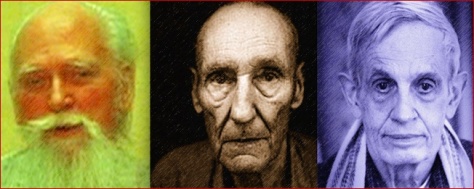
Designing a Creature
That Will Hunt Us Down
Animatronics research is making so many strides lately that soon Disney theme parks won’t need actors donning smelly Mickey customs to scare the living hell out of little children. Robots will be able to do just that, and more, in their place. Bad news to actors, of course.
Androids may not be close to pouncing on you on your vacations, out of malfunctioning or pure evil, but the real scare may be other fields tapping into their sophistication. The military, for instance. Something to be expected, for sure, but still no less disturbing.
It didn’t happen overnight, but suddenly pop culture is saturated with the idea that a dawn of the automaton is imminent, even sooner than the one of rotten zombis. And while trying to keep apace with the expectation, science is landing us on some tricky territory.
Call it a land of opportunity, as announced on Blade Runner, or the brave new world of old Aldous Huxley. Say that Philip K. Dick had it all figured it out, or that religion created the original Other, in the form of invisible beings who exist to serve, or curse us to death.
Just don’t say you were not forewarned. For if you give it a thought or two, what with super population, and income inequality, and all that can spoil your dinner, who really needs yet another cast of dependent beings to keep even more people out of things to do?
THE MOMENT THEY’LL WAKE UP
That assuming that they will remain dependent, and existing to the sole purpose of fulfilling our every whim. Because if they don’t, and turn into our lords, there’ll be no point for ‘I told you sos,’ specially if we’ll all be their slaves, tethered to some infernal contraption.
So yes, by now you may’ve gathered that we are kinda excited about Westworld, the upcoming TV series inspired by the old Michael Crichton movie. And that this is a shameless attempt to flag the insane human desire to play god to manufactured creatures, all the while deflating our own expectations.
For however good the series turn out to be it’ll probably pale in comparison with Second Variety, an 1953 P.K.D. story, or even the considerably downgraded 1995 movie based on it, Screamers. That’s when the concept of self-run machines has been taken to just about the threshold of everyone’s nightmares.
REHEARSING FOR THE BIG CHASE
After all, we’ve been trying to build them, either by faith or ingenuity, since time immemorial. The more we see them embodied albeit pixelated, the closer we get to fully realize their feasibility. We’ll embrace them and run for our dear lives, all at the same time, while technology will, once again, overcome our moral ambivalence.
Thus these related posts below, about Artificial Intelligence and robotics, the two fields whose merge will at last produce what already appears inevitable: creation of an artificial but sentient being to run amok exactly the way we’ve been dreading all along. Just like we told you so. Speaking of theme parks, enjoy the ride.
Not Human

Humanoids to Replace
Body Parts, Not Maids
Mankind’s ancient dream of creating automatons that can stand in for us, when our bodies no longer function properly, got a bit closer to reality not long ago. Thanks to research developed at Brown University, two stroke victims, long unable to move or speak, managed to control a robotic arm solely with their minds.
The good news couldn’t come anytime sooner: just a few days earlier, a Tokyo-based robotics developer team had announced the creation of a highly interactive, and disturbingly human-like, pair of buttocks, that responds to touch and stimuli. To be honest, the robotic butt got us thinking where on earth was this kind of research going.
In a way, it all comes full circle, you see. The development of humanoids, capable of simulate emotions and be responsive to sound, sight and touch, has been making great strides, specially by Japanese engineers. Sometimes, their extreme similitude to humans is quite frightening and one is led to think of Blade Runner-type of nightmarish visions of the future.
At the same time, albeit running in a parallel track, research on artificial intelligence and nanotechnology is also well advanced. The combination of these two fields, so far only partial, does suggest that reality is tracking closely the visions that science-fiction authors had conceived long ago.
To be sure, what’s been studied at Brown diverge fundamentally from research on androids, even though they both follow the same principle: to emulate the human ability of combining thought-processing with physical acts.

GOOD ROBOT, BAD ROBOT
But whereas at Brown, the practical applications are already evident, the objectives of research into the development of humanoid robots lack clarity, for except in the case of slave labor, is hard to imagine why (more)
_______
Read Also:
* Man Made
* Hallow Talk
Continue reading →





























